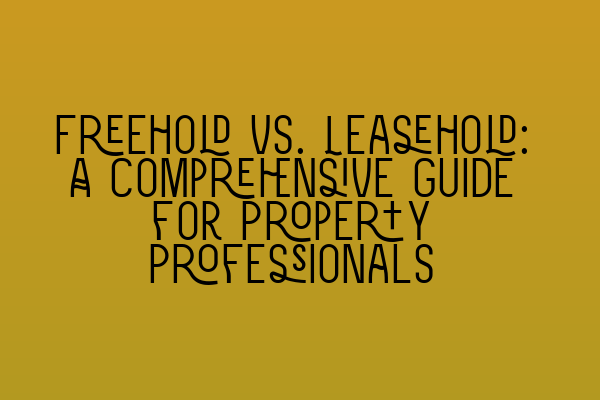Freehold vs. Leasehold: A Comprehensive Guide for Property Professionals
Welcome to SQE Property Law & Land Law! As property professionals, it is crucial to have a comprehensive understanding of the different types of property ownership. In this guide, we will delve into the key differences between freehold and leasehold, helping you navigate the complexities of property law. Whether you are a solicitor, real estate agent, or property investor, this guide is essential reading.
Understanding Freehold
Let’s start by understanding what freehold means. In simple terms, freehold ownership grants the owner full rights and control over the property. With a freehold property, you own both the land and the building outright, giving you complete autonomy. This type of ownership is most commonly associated with houses, although it can also apply to commercial premises.
One of the primary advantages of freehold ownership is the absence of any time restrictions. You are not bound by a lease and have the freedom to make decisions about the property without seeking permission from anyone else. It also means that there are no ground rents or service charges to pay. You have complete control over any alterations or improvements you wish to make to the property, allowing you to maximize its value.
Understanding Leasehold
In contrast, leasehold ownership is when an individual or entity owns the rights to a property for a specified period of time, but not the land itself. Typically, leaseholds are associated with flats and apartments, as well as some commercial properties. In this arrangement, the freeholder owns the land and grants a lease to the leaseholder.
Leasehold ownership comes with certain obligations and restrictions. The lease will outline the terms and conditions that the leaseholder must adhere to during their tenure. It may include provisions regarding maintenance responsibilities, ground rents, and service charges. The leaseholder may also need to seek permission for any alterations or improvements they wish to make to the property.
Key Differences
Freehold and leasehold ownership have several fundamental differences that property professionals must be aware of. Let’s explore some of the key distinctions:
1. Ownership: Freehold ownership grants complete ownership of both the land and the property, while leasehold ownership grants ownership of the property for a specific period of time, but not the land itself.
2. Duration: Freehold ownership is indefinite, while leasehold ownership is for a fixed period of time, as specified in the lease.
3. Responsibilities: Freehold owners are solely responsible for the maintenance and upkeep of the property, while leasehold owners may have specific responsibilities outlined in the lease, such as paying ground rents and service charges.
4. Control: Freehold owners have full control over the property, including making alterations and improvements. Leasehold owners may need to seek permission from the freeholder before making changes.
5. Costs: Freehold ownership does not involve any ground rents or service charges, while leasehold ownership often entails these additional expenses.
6. Transferability: Freehold properties are generally easier to sell or pass on through inheritance, while leasehold properties require the transfer of the lease, which may involve certain restrictions or requirements.
Understanding both freehold and leasehold ownership is crucial for property professionals to provide accurate advice to clients. It is important to consider the client’s specific circumstances and objectives before recommending one type of ownership over the other.
Conclusion
In summary, freehold and leasehold ownership offer distinct advantages and considerations. Freehold ownership provides complete control and autonomy, while leasehold ownership offers a time-limited arrangement. Understanding the differences between the two is vital for property professionals to serve their clients effectively.
At SQE Property Law & Land Law, we specialize in providing expert advice on all aspects of property law. If you require assistance or have any questions regarding freehold or leasehold ownership, do not hesitate to reach out to our experienced team.
Related Articles:
– Understanding Contractual Capacity: Rights and Limitations
– Interactive SQE Mock Tests for Contract Law: Test Your Knowledge
– Join Our SQE Contract Law Webinars: Expert Insights and Guidance
– SQE Prep: Mastering the Essentials of Contract Law
– Contractual Capacity: Understanding Legal Competence in Contracting Parties
We invite you to explore these related articles to further enhance your knowledge in property law and related areas. Stay tuned for more informative content from SQE Property Law & Land Law!
